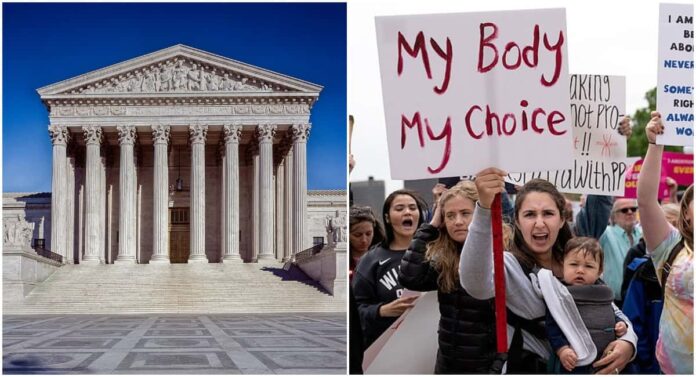Texas Right to Life hopes to replicate the Texas abortion law nationwide.
The U.S. Supreme Court upheld a new Texas abortion law that bans abortions once a heartbeat is detected in a ruling Wednesday.
The Texas abortion law went into effect Wednesday, making Texas the first state to effectively ban a majority of abortions from being performed in the state.
The ruling added that “it is unclear whether the named defendants in this lawsuit can or will seek to enforce the Texas law against the applicants in a manner that might permit our intervention” and noted that Texas “has said that neither it nor its executive employees possess the authority to enforce the Texas law either directly or indirectly.”
The justices ruled 5-4 in an unsigned opinion, denying a request for injunctive relief or to vacate stays of the district court proceedings. The majority of justices wrote that the petitioners did not meet the burden required to prove the “complex and novel antecedent procedural questions” they raised.
Roughly 85% of abortions are performed after six weeks of pregnancy, around the time when a baby’s heartbeat can first be detected. The new Texas law requires doctors to determine if a heartbeat can be detected before performing any procedure. If it is detected, abortions and abortion-inducing drugs are prohibited. Penalties carry fines and jail time for abortionists.
Likewise, it remains unclear if under existing precedent the court could “issue an injunction against state judges asked to decide a lawsuit under Texas’s law.”
Although the order was unsigned, the majority included Justices Clarence Thomas, Samuel Alito, Neil Gorsuch, Brett Kavanaugh and Amy Coney Barrett.
The court’s ruling added: “We stress that we do not purport to resolve definitively any jurisdictional or substantive claim in the applicants’ lawsuit. In particular, this order is not based on any conclusion about the constitutionality of Texas’s law, and in no way limits other procedurally proper challenges to the Texas law, including in Texas state courts.”
Roberts suggested that the case is not closed. In his statement, he said that while the court denied the emergency relief requested, the ruling is “emphatic in making clear that it cannot be understood as sustaining the constitutionality of the law at issue.”
The four dissenting were Chief Justice John Roberts and Justices Stephen Breyer, Elena Kagan and Sonia Sotomayor, who each wrote separate statements.
Texas Gov. Greg Abbott said in response to the ruling that “No freedom is more precious than life itself. Starting today, every unborn child with a heartbeat will be protected from the ravages of abortion. Texas will always defend the right to life.”
The petitioners are continuing with their lawsuit in the 5th Circuit Court of Appeals.
Petitioner Nancy Northup, president and CEO of the Center for Reproductive Rights, said, “We are devastated that the Supreme Court has refused to block a law that blatantly violates Roe v. Wade.” She also called on Congress to pass a national law, the Women’s Health Protection Act, to codify abortion rights. Northup said they have the majority of votes needed in the House and 48 votes in the Senate.
President Joe Biden said in a statement that he’s asked the Department of Health and Human Services and the Department of Justice to “see what steps the federal government can take to ensure that women in Texas have access to safe and legal abortions as protected by , and what legal tools we have to insulate women and providers from the impact of Texas’ bizarre scheme of outsourced enforcement to private parties.”
Texas Right to Life hopes to replicate the Texas abortion law nationwide.
“We are devastated by today’s ruling,” Amy Hagstrom Miller, CEO of Whole Woman’s Health, the lead plaintiff in the case, said in a statement. “Our patients are scared and confused and desperately trying to figure out what they can do to get an abortion. We don’t know what will happen next. Our staff and providers are so afraid.”
The New Texas Abortion Law
The Texas abortion law is different from laws passed in other states that seek to limit abortions because it prohibits state officials from enforcing the law and relies solely on civil liability. Anyone can attempt to enforce the law by suing abortion providers or anyone who aids someone in getting an abortion in the state after a heartbeat is detected. Doctors and those aiding and abetting them who violate the law can be sued multiple times for a minimum of $10,000 per violation.
“The Texas Heartbeat Act is the strongest Pro-Life law to take effect since the unjust ruling of Roe v. Wade (1973),” the group said in a statement.
Bethany Blankley | The Center Square contributor
Go to Source
Reposted with permission


